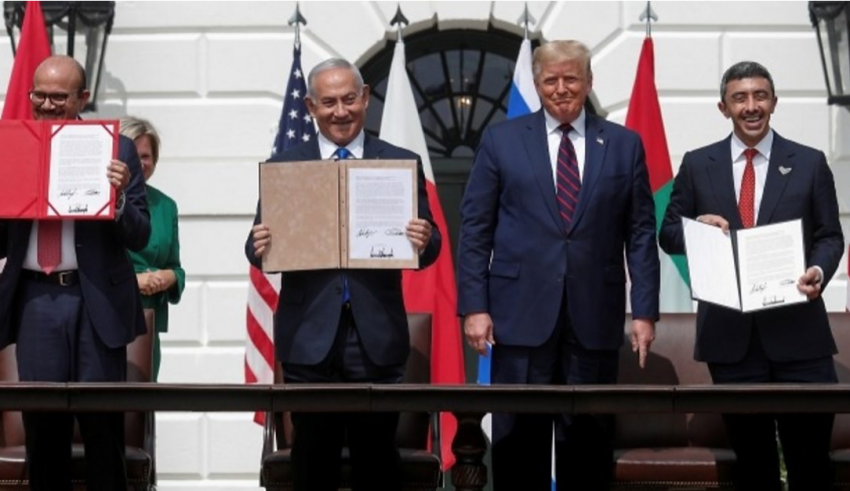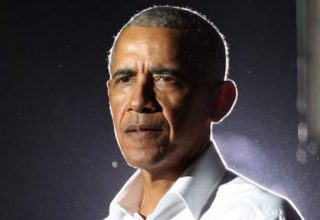
US President Donald Trump has hailed the “dawn of a new Middle East”, amid Israel’s landmark deals with the United Arab Emirates (UAE) and Bahrain.
Mr Trump spoke as the two Gulf states signed agreements fully normalising their relations with Israel.
The three countries hailed the deals as historic, as did Mr Trump, whose administration helped broker them.
The Gulf states are just the third and fourth Arab countries to recognise Israel since its founding in 1948.
Mr Trump hopes other countries will follow suit, but the Palestinians have urged them not to while their conflict remains unsolved.
For decades, most Arab states have boycotted Israel, insisting they would only establish ties after Israel’s dispute with the Palestinian was settled.
“After decades of division and conflict we mark the dawn of a new Middle East,” Mr Trump told a crowd of hundreds gathered at the White House on Tuesday.
“We’re here this afternoon to change the course of history,” he added.

Israeli Prime Minister Benjamin Netanyahu welcomed the deals, saying, “This day is a pivot of history; it heralds a new dawn of peace.”
But Palestinian leader Mahmoud Abbas said only an Israeli withdrawal from occupied territories could bring peace to the Middle East.
“Peace, security and stability will not be achieved in the region until the Israeli occupation ends,” he said in a statement after the signing of the deals, AFP news agency reports.
The Israeli army said that two rockets were fired from the Gaza Strip into Israel while the ceremony was under way.
Why are these agreements being hailed as ‘historic’?
Before the UAE and Bahrain, the only other Arab countries in the Middle East to recognise Israel officially were Egypt and Jordan, who signed peace treaties in 1978 and 1994 respectively.
Mauritania, a member of the Arab League in north-west Africa, established diplomatic relations with Israel in 1999 but severed ties in 2010.

All eyes will be on whether other countries in the region follow suit, above all Saudi Arabia. So far, the Saudis have signalled that they are not ready.
The agreements are also likely to usher in new security ties in a region where many of the Gulf Arab states share with the Israelis a common adversary in Iran.
A significant achievement
Analysis by Gary O’Donoghue, Washington correspondent
These agreements represent the most significant diplomatic achievement of the Trump administration.
Persuading two Arab states to engage in this kind of rapprochement with Israel – without a solution to the Palestinian question – marks a significant move for pan-Arab unity.
The specific details of the agreements are not yet public, but there will be embassies, commercial deals and the opening of travel links between the countries. Mr Trump even suggested five other Arab states were “far down the road” towards finalising similar arrangements.
But the agreements have been condemned by the Palestinian leadership as a “black day” for the region. Developments on the ground in the occupied West Bank and Gaza could still derail these new relationships.
Why have Palestinians condemned the deals?
The Palestinians have said the agreements are dangerous betrayals.
They believe the moves by the Gulf countries renege on a promise by Arab states not to embrace ties with Israel until Palestinian statehood is achieved.
The UAE has said progress on Palestinian statehood is central, and that their agreement included a promise from Israel to “suspend” its controversial plan to annex key parts of the occupied West Bank that were allocated to it by President Trump under the Middle East peace plan he unveiled in January.
The Palestinians rejected Mr Trump’s proposals as biased towards Israel and warned that annexation would destroy their hopes of a viable future independent state and violate international law – a stance supported by much of the international community.
The UAE’s minister of state for foreign affairs told the BBC that it had sensed an “opportunity” when Mr Netanyahu signalled he would press ahead with annexation earlier this year.
“Everybody was worried about the annexation of Palestinian lands, which was really a threat to the viability of the two-state solution,” Anwar Gargash said.
“And I think this sort of brought our plans forward and gave us a reason, a clear reason and clear rationale, why a decision that we would have taken in 2021 or 2022 should be taken now.”
Mr Gargash said he did not believe Mr Netanyahu or another Israeli leader would be likely to renege on the promise to suspend the annexation plans.
The UAE has called on the Palestinian leadership to use this moment to reorganise its approach and prepare to re-engage in productive discussions with Israel.
In a statement issued after he attended the ceremony at the White House, former UK Prime Minister Tony Blair said the deals were “a massive and welcome opportunity to recast the politics of the region”.
He said he understood Palestinian objections but that “in time, the Palestinian people will understand that it is only by radically changing strategy that the legitimate aspirations for a viable Palestinian state can be realised”.
What’s the background?
There is a backdrop of the regional rivalry between Saudi Arabia and Iran in these diplomatic moves.
The decades-old feud between them is exacerbated by religious differences. They each follow one of the two main branches of Islam – Iran is largely Shia Muslim, while Saudi Arabia sees itself as the leading Sunni Muslim power.
The UAE and Bahrain are both Saudi allies.
Saudi Arabia’s response will be watched closely. There is no indication yet it is ready to follow Bahrain and the UAE.
Prior to the announcement of the UAE agreement in August – which included the suspension of Israel’s controversial plans to annex parts of the occupied West Bank – Israel had had no diplomatic relations with Gulf Arab countries.
Last month saw the first official flight from Israel to the UAE, which was seen as a major step in normalising relations.
President Trump’s son-in-law and senior adviser Jared Kushner, who was on the plane, described the UAE deal as having “the ability to change the whole course of the Middle East”.
Source: bbc.com

















